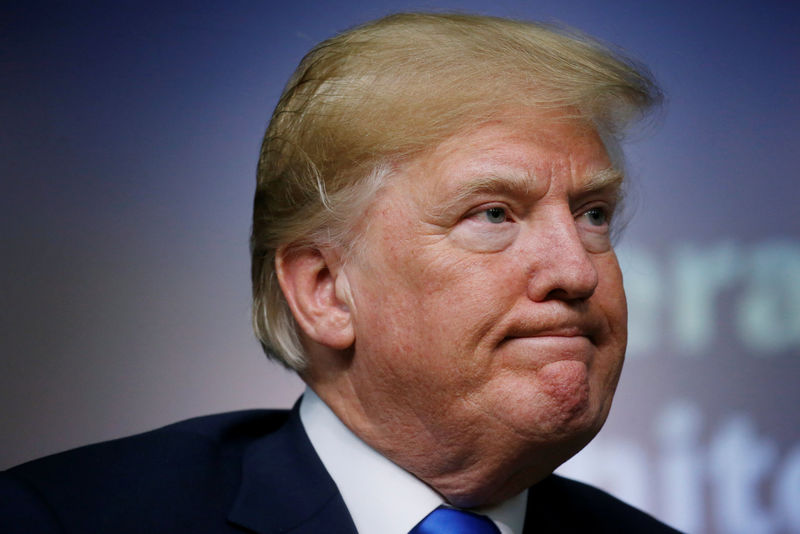(Bloomberg) -- President Donald Trump’s trade policies are taking some air out of the high-flying economic optimism that had prevailed among American companies and consumers since his 2016 election.
Confidence gauges spanning small businesses, factories and the public at large are coming off the boil as U.S. tariffs on imported metals -- along with threats and counterthreats over Chinese goods -- roil the stock market and cast a cloud over what was otherwise a bright economic outlook. The latest indications arrived Thursday in the Federal Reserve Bank of Philadelphia’s regional manufacturing survey and the Bloomberg Consumer Comfort Index.
While there’s no sign of a collapse, the widespread cooling-off in sentiment warrants monitoring. Consumer spending accounts for about 70 percent of the economy, and manufacturing -- around 12 percent -- has been posting strong gains that helped power three consecutive quarters of U.S. growth above or near a 3 percent pace last year.
“Consumer and business confidence is still high -- it’s just not quite as giddy as before,” said Scott Brown, chief economist at Raymond James Financial in St. Petersburg, Florida. Trump’s tariff policies “are just a bad idea” that amount to a tax on businesses and consumers, and more broadly, people “are coming to the realization that maybe growth will not be quite as strong as they thought,” Brown said.
Trade tensions were front and center as global policy makers met in Washington for spring meetings of the International Monetary Fund and World Bank, with IMF Managing Director Christine Lagarde cautioning against protectionism. “What is extraordinarily meaningful is the questioning of the overall system under which operators have been operating for decades,” she said Thursday. “It’s the confidence that risks being eroded.”
The Fed’s Beige Book report on Wednesday underscored the risks. In the Dallas Fed region, for example, several contacts in manufacturing “noted that the newly enacted tariffs were creating a lot of uncertainty in their outlooks for activity and prices,” the report said.
‘Improved Deals’
Peter Navarro, Trump’s director of trade and manufacturing policy, said that “as improved deals are concluded, uncertainty over the negotiations will naturally subside.”
“Renegotiating bad trade deals and successfully negotiating new deals are already proving to be great for the businesses, consumers, and workers of America,” Navarro said in a statement, citing the renegotiation of an accord with South Korea and commitments for U.S. factory investment in the wake of tariffs on imported items.
Confidence had soared in the past year and coming into 2018 for a number of reasons: Trump’s election, tax cuts and reduced regulations, to name a few. Optimism remains elevated amid a solid job market, rising corporate earnings, and easy financial conditions. The pace of expansion in the first quarter probably eased, in part due to a seasonal quirk in the data, but will probably bounce back in the April-June period, according to economists.
Yet the tariff policies and threats -- stemming from Trump’s pledges to improve the lot of U.S. workers and reduce the trade deficit -- are showing there’s a limit to the cheer, especially as business costs rise.
The Philadelphia Fed’s index of business activity six months from now dropped 7.2 points to 40.7 in April, the lowest level since July. Earlier this week, a similar report from the New York Fed showed its future business conditions index registered the steepest one-month drop since the Sept. 11 terrorist attacks. Meantime, factories in both regions are reporting rising prices.
Those reports followed the Institute for Supply Management’s manufacturing survey released April 2, which showed a measure of materials prices-paid also rose to an almost seven-year high in March. About 32 percent of respondents’ comments were related to the threat of duties, which hadn’t yet gone into effect when the survey was done. Concerns ranged from higher costs to limited availability around production schedules, according to Timothy Fiore, chairman of the group’s factory survey committee.
Small firms may also be seeing an impact. The National Federation of Independent Business’s index of small-business optimism fell in March to a five-month low, with expansion plans and sales expectations easing. While overall sentiment is still near a 45-year high, eight of the 10 components that make up the gauge declined in March.
On the household side, the Bloomberg Consumer Comfort report showed a monthly gauge of economic expectations slid in April to match its 2018 low. At the same time, its weekly measure of sentiment edged up to a fresh 17-year high, though its economic component slipped to the lowest since January.
Last week’s figures from the University of Michigan showed consumer sentiment fell more than forecast in April to a three-month low. That report also said 29 percent of respondents made spontaneous references to trade policies, with nearly all of the comments being negative.
